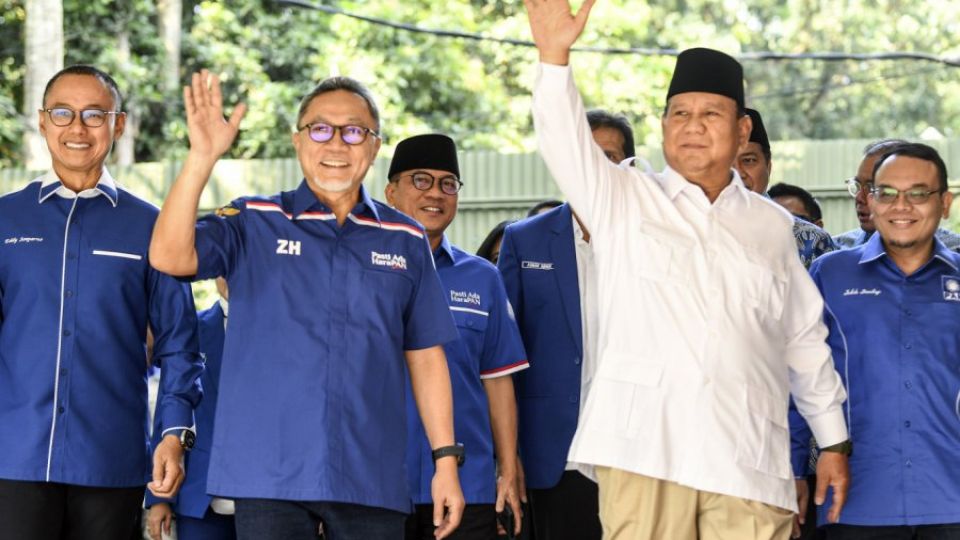February 23, 2024
JAKARTA – Two major credit rating agencies, Fitch Ratings and Moody’s, have raised concern that Prabowo Subianto’s expensive campaign promises could result in more expansionary fiscal policy.
As the presidential hopeful, Prabowo plans to realize those programs by increasing the tax ratio, as well as setting up a new state revenue agency that would report directly to the president.
However, the rating agencies believe such reforms may take time, while the implementation of the pledges may be imminent.
Analysts warn that sudden increase in government spending to swiftly fulfil all of Prabowo’s promises could breach the budget deficit cap, which is set by law at 3 percent of GDP.
They urge the former general to reveal the financing plans for his programs, as well as the potential impact on the fiscal position, to reassure markets.
In his election campaign, Prabowo promised several big-ticket programs, such as continuing the construction of the new capital city, increasing defense spending and raising public servants’ salaries.
The centerpiece of his campaign, free school lunches and nutritional support for 82.9 million people, would require some Rp 400 trillion (US$30 billion) per year, according to Dedek Prayudi, spokesperson for the youth division of Prabowo’s campaign team.
That is equivalent to 12 percent of the entire state budget for this year and around 2 percent of the country’s GDP.
Thomas Rookmaaker, head of Asia Pacific sovereign ratings at Fitch Ratings, said Prabowo’s plan added to uncertainty surrounding the country’s medium-term fiscal policy.
He cited comments published by the firm in September last year that indicated that a material rise in Indonesia’s public debt burden would negatively affect its sovereign credit profile.
“Initially, our baseline scenario is for Indonesian government debt to continue its gradual declining path, with fiscal deficits kept below 3 percent of the GDP. However, Prabowo’s statements suggesting the country could sustain a significantly higher government debt-to-GDP ratio point to risks to our projections,” he told The Jakarta Post on Tuesday.
Rookmaaker acknowledged that Prabowo also promised to increase the revenue-to-GDP ratio to around 23 percent, which would enhance public finance flexibility and strengthen the country’s credit profile. However, according to him, there is no clear plan on how the presidential hopeful aims to achieve that.
“Experience suggests that raising the state revenue-to-GDP ratio may not be that easy, and such reforms may take considerable time,” Rookmaaker noted.
Moody’s also stated that some of Prabowo’s pledges could indicate the pursuit of a more expansionary fiscal stance. If implemented, those programs would mark a divergence from Indonesia’s long track record of conservatively managed budgetary finances and debt ratios.
“At this juncture, implications for sovereign creditworthiness are still neutral, although we will keenly watch the composition of parliament for greater clues on policy direction and reform implementation,” said Anushka Shah, senior credit officer at Moody’s Investors Service, in a statement.
Clarity needed
According to Bhima Yudhistira, executive director of the Center of Economic and Law Studies (CELIOS), the state budget deficit-to-GDP ratio may surge to 5 percent in the worst-case scenario should Prabowo decide to be aggressive in spending.
The defense minister’s statement made during a presidential election debate about the possibility of pushing the debt-to-GDP ratio up to 50 percent raised concerns that he would pursue that path to fund his “populist programs”, Bhima told the Post on Monday.
In fact, the deputy chief of Prabowo’s campaign team, Erwin Aksa, suggested raising the maximum deficit cap from 3 percent to 6 percent, which would require legal changes.
“If there is a rise in fiscal risk, credit rating agencies may reevaluate Indonesia’s sovereign rating and downgrade it. As a consequence, investors would demand higher returns on our bonds,” Bhima explained.
Thus, he suggested that the pledges be executed gradually to soften the impact on the state coffers. For example, the free lunch program could begin in the country’s eastern part, which has high rates of malnutrition.
Winarno Zain, an economist at publicly-listed energy service firm Radiant Utama, opined that the current structure of Indonesia’s fiscal policy left hardly any room for additional expenses. Thus, forcing a new program into the state budget would push the deficit beyond 3 percent.
“From the revenue side, commodity prices are still low, and tax reform has not increased state revenue in an optimal way. At the same time, economic growth will continue to be around 5 percent,” Winarno told the Post on Monday.
According to Eddy Soeparno, another deputy chief of Prabowo’s team, several options may be considered to fund the campaign promises, including the free lunch program. These included increasing the tax ratio, pushing economic growth through industrialization as well as reducing spending on mistargeted energy subsidies.
However, he added, those options were still being calculated by the team’s experts.
Bhima from CELIOS suggested that Prabowo’s team immediately compose a detailed plan for funding the campaign programs to retain the trust of credit rating firms. This should include execution timelines as well as the potential implications for the country’s fiscal and economic metrics.


